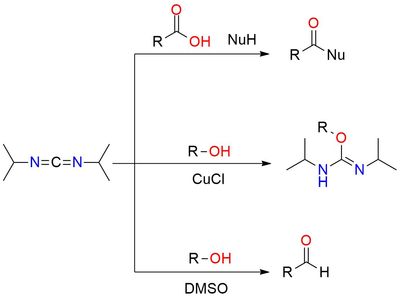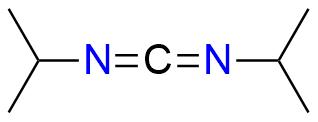CAS 693-13-0, Cat. No EN300-21624
The coupling reagent used for the preparation of amides, peptides, ureas, heterocycles, and unsymmetrical carbodiimides

1,3-Diisopropylcarbodiimide or DIC is The coupling reagent used for the preparation of amides, peptides, ureas, heterocycles, and unsymmetrical carbodiimides. It is a colorless liquid, with a relatively low boiling point (145-148C°)1. DIC is a very effective agent for the activation of carboxylic acids toward nitrogen nucleophiles. In fact, in a comparative study of carbodiimides, DIC was shown to be a better coupling agent in the solution phase than EDC–HCl, EDC–methohexafluorophosphate, and EDC–methiodide. DIC, as a coupling agent, is more amenable to solid-phase peptide synthesis than DCC and EDC for several reasons in cases when HATU is too expensive for large-scale synthesis1.
Synonyms: DIC; DIPC; DIPCD; DIPCDI; N,N’-methanetetraylbis-2-propanamine; N,N’-diisopropylcarbodiimide; 1,3-diisopropylcarbodiimide; 2-propanamine, N,N’-methanetetraylbis-(9ci)
Selected publication
-
1,3-Diisopropylcarbodiimide.
Nora G.; Schous C.; Troyer S.; Miller M. Encyclopedia of Reagents for Organic Synthesis 2003. DOI: 10.1002/047084289X.rn00190

